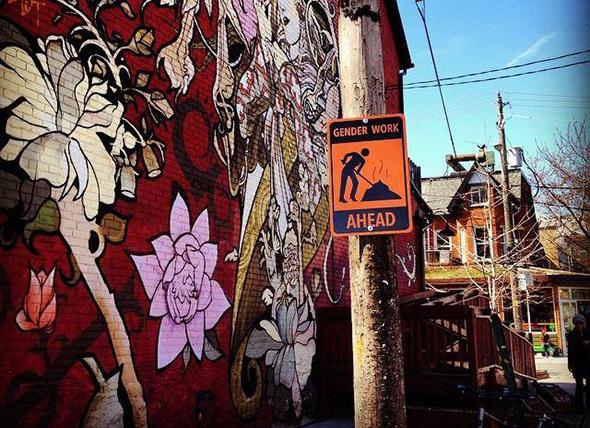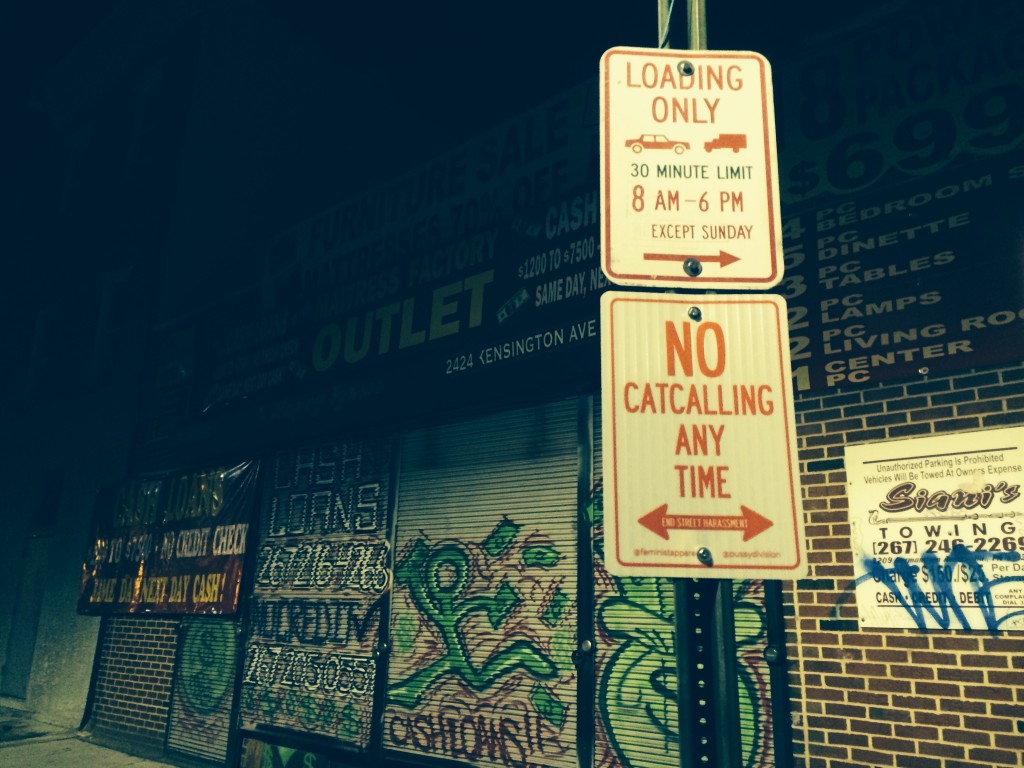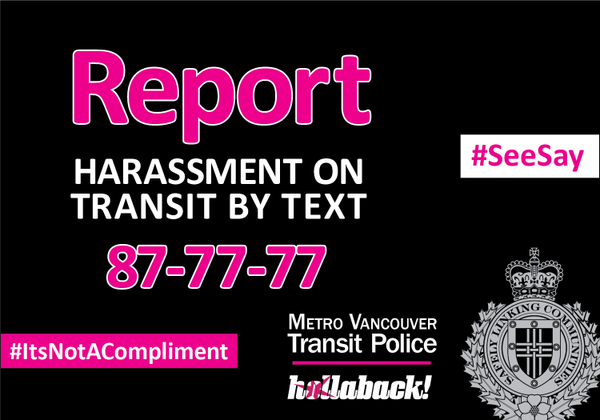Learn about a new anti-harassment campaign in Guyana.
And a new campaign by Stop Harcèlement de Rue in France launched for International Anti-Street Harassment Week.
Making Public Spaces Safe and Welcoming
By HKearl
Learn about a new anti-harassment campaign in Guyana.
And a new campaign by Stop Harcèlement de Rue in France launched for International Anti-Street Harassment Week.
By HKearl
““Stripped” is a social drama broaching the most sensitive and often neglected aspect of a woman’s life. This is a story about Ana, who is a modern working girl. She’s well educated and quite liberated. Yet, whenever she has to deal with the perversion of men around her, she feels violated. Otherwise, a brave woman, she finds the act of ogling very disturbing. Given that, it’s not seen as a crime, she feels helpless and is forced to go through the process day in day out. The movie, narrates the story of a normal day in her life, what happens around her and what she feels inside.”
Robert Wood Johnson Foundation:
“Julia Retzlaff, age 18, loves exploring her city and visiting friends all over San Francisco. But the fear of being sexually assaulted on public transportation is forcing her to reconsider going out at all. Produced for the Robert Wood Johnson Foundation’s Equity Workshop at TED 2015 in association with the Bay Area Video Coalition in San Francisco, Calif”
FAAN Mail created short videos featuring Philadelphia people’s stories at their International Anti-Street Harassment Week event on April 12. Watch them all on their YouTube channel. Here is one example:
By HKearl
Gracias, شكرا, धन्यवाद, Danke, хвала, Merci, THANK YOU!
Thank you for rising to the occasion and taking a stand against sexual harassment in public spaces last week! Groups in 40 countries took actions online and offline, from rallies and marches to workshops with youth, from Tweet chats and Google hangouts to sharing images on social media. We made a big splash both online and offline, reaching millions of people. Congratulations on all you have helped achieve!
– Holly, founder of the week
I just wanted to thank you so much for participating in #EndSHWeek this year. It was such a thrill to see what everyone was planning – your actions were so creative and inspiring! As you may have noticed, this event is growing every year – if you have any feedback on how we can improve for next year, I would love to hear it! Thanks for your activism.
– Britnae, online manager for the week
VIEW PHOTOS:
View nearly 600 photos of actions | View a smaller album with one image per country.
REPORT BACK:
Please let us know what YOU did so we can include it in our wrap-up report.
HIGHLIGHTS:
* Anti-harassment transit campaigns launched in London, Los Angeles, and Vancouver and a new study about harassment on the transit system in France found that 100% of women have been harassed
* Fiona Patten, a member of Parliament in Victoria, Australia, raised the issue of street harassment in Parliament
* Women in Afghanistan and Iran shared their street harassment stories on the SSH Blog
* Six main hashtags were used across the week on Twitter: #Endsh #Endshweek #plutotsympa #everydaysexism #AcosoEsViolencia #NoAcosoCallejero
* The UK-based international group Everyday Sexism. Founder Laura Bates said that on April 16 alone, 45,000 people tweeted about sexism, including street harassment, using the hashtag #everydaysexism.
* In France, after a business woman tweeted that getting whistled at is nice, thousands of people shared their street harassment stories using the hashtag #plutotsympa. The hashtag trended for part of the day on April 16
* Numerous tweet chats and google hangouts took place. Read the recaps or watch the videos:
Reporting street harassment | Practical solutions to street harassment | Global Tweetathon | Street harassment across the world
The NOW Young Feminists & Allies virtual chapter hosted a google hangout about street harassment and multiculturalism.
Me=You: Sexual Harassment Awareness held a Google hangout Q&A with SSH board member Erin McKelle
* In Latin America, NGOs in Chile, Argentina, Brasil, Colombia, El Salvador, Nicaragua, Peru, Ecuador and Uruguay took photos with anti-harassment, pro-respect messages and posted them on social media.
* For a taste of the range of actions, here are four examples of activism that took place in Nepal, the Netherlands, India and Italy
* New street signs about street harassment went up in New York City, Philadelphia and Toronto. The USA-based sign sparked dozens of news articles, including this news story featuring SSH board member Maliyka Muhamad and my article for Feministing.com.
* Many teenagers spoke out against street harassment. Not only did they participate in offline actions like workshops and rallies in countries like Cameroon, Egypt, India, and Nepal, but they also wrote about their experiences. For example, “Don’t ignore the street harassment stories of young girls” by a 17-year-old in California, Chloe Parker and teenagers in Fort Walton Beach made a video about street harassment.
* SSH is based in the Washington, DC-area and we organized or were part of five offline events and actions across the week
* There were at least 80 media hits in at least 10 countries.
The week may be over, but our work is far from done. Wherever we are, we must continue to challenge the status quo, the discrimination against all women, members of the LGBT community, persons of color, persons with disabilities, and others who are marginalized. We must strive to make public places safer for all.
With gratitude for the risks you take to speak out, for the determination you have to make change,
Holly
By HKearl
Innovative street signs went up in Toronto, New York City and Philadelphia during International Anti-Street Harassment Week last week.
Toronto (via blogTO):
 “A new public art project in Kensington Market kindly asks catcallers to STFU. Dubbed the The Street Talk Project, the artistic intervention involves street signs that admonish sexual harassment on Toronto streets and that support equal rights for women and trans* people.
“A new public art project in Kensington Market kindly asks catcallers to STFU. Dubbed the The Street Talk Project, the artistic intervention involves street signs that admonish sexual harassment on Toronto streets and that support equal rights for women and trans* people.
“Using humour and subversive advertising, The Street Talk Project [brings] attention to the ways in which public space is navigated differently by different people,” reads the organizers’ description of the project. It also addresses “how sexism is felt viscerally on a day-to-day basis” and promotes “solidarity for the safety of women and trans* people.”
The project debuted yesterday and also involves an exhibition at Whippersnapper Gallery. There are seven signs in total, which have been installed around the Market. The idea was to place them in a highly trafficked area to generate as much discussion as possible.”
New York City and Philadelphia (via my article at Feministing.com):
 “Members of Feminist Apparel and Pussy Division put up 25 street signs against catcalling in Philadelphia and New York City. They worked with a street sign manufacturer to produce them and released them specifically for International Anti-Street Harassment Week. Their goal was to create ‘further dialogue surrounding the issue of street harassment,’ Alan Martofel, production coordinator for Feminist Apparel, told me.
“Members of Feminist Apparel and Pussy Division put up 25 street signs against catcalling in Philadelphia and New York City. They worked with a street sign manufacturer to produce them and released them specifically for International Anti-Street Harassment Week. Their goal was to create ‘further dialogue surrounding the issue of street harassment,’ Alan Martofel, production coordinator for Feminist Apparel, told me.
Since it is a form of guerrilla activism, they did not gain permission from the city to post the signs and they are unsure how long they will be up. But they say that already they are having an impact.
One of the members of Pussy Division, a group based in Philadelphia who has done other street art activism, such as posting “stop rape” stickers and spray painting anti-harassment messages on sidewalks around the city, told me, ‘We’ve had so much positive feedback. A lot of people will share harassment that just happened to them and say they are happy to see the sign and feel less alone.’
For her, the goals of the project are to spread the message that street harassment is an important issue everywhere and to help survivors. ‘We would like people who deal with street harassment every day to look at it and feel validated about their feelings of really hating going through it and feeling objectified.’ She continued, ‘We are taught — especially women — that this is part of life and that we should deal with it and be happy about it. But we’re not happy about it. It’s important for harassed people to hear from other people who are on the same page as them.’
By HKearl
Sexual harassment is a problem on transit systems worldwide. Women in particular face a lot of harassment (one piece of evidence is this 2014 poll of riders from 16 major transit systems in the world). More than a dozen countries even offer women-only transit options as one (band aid, short-term) solution, including in Egypt, Japan, India, Mexico, and Nepal.
But anti-harassment PSAs and reporting efforts are gaining traction, too. Earlier this year, both New York City and Washington, DC, released new PSAs about harassment (SSH helped with the ones in the DC). In DC, there is an online reporting form and front line transit staff are trained to handle harassment complaints.
Last week, over International Anti-Street Harassment, transit systems launched new anti-harassment campaigns in:
London (“Report It To Stop It“)
Los Angeles (“It’s Off Limits” – passengers who see or experience sexual harassment can call the sheriff’s hotline at 888-950-7233 or report through the free LA Metro Transit Watch safety app)
Vancouver (#ItsNotaCompliment)

In France, a new study released last week found that 100% of women had been harassed while riding public transportation and I talked to staff at the office of women’s rights who said they will be launching a nation-wide campaign next month to address it (to my knowledge, they will be the first country to do this on that scale).
This is all great news. We need more transit systems to step up and take this issue seriously.